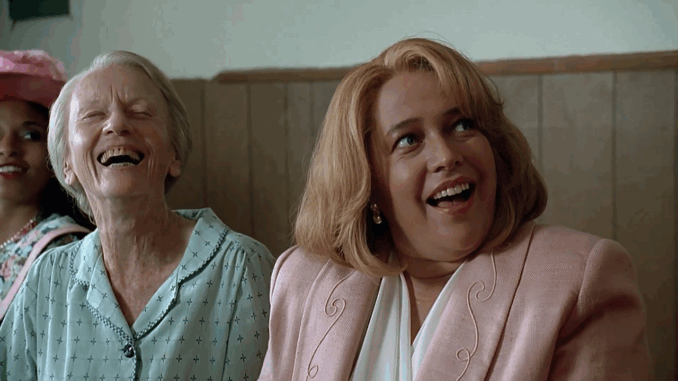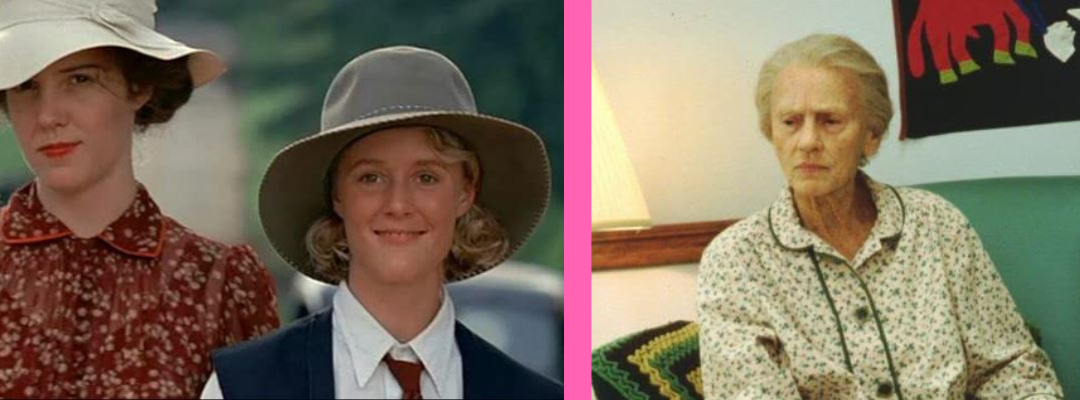
When Fried Green Tomatoes premiered in 1991, it may have seemed like a quiet Southern story about friendship, food, and memory. But beneath its warm surface lies a radical narrative—one that confronts, defies, and ultimately redefines the role of women in a patriarchal world. It is a film about women stepping outside the lines drawn for them, and the courage it takes to live authentically.
Ruth Jamison: From Submissive Wife to Liberated Survivor
Ruth’s story is the most explicit confrontation of gender oppression. At first glance, she embodies the traditional Southern ideal: gentle, devoted, modest. Yet she lives trapped in a marriage with Frank Bennett, a man who is emotionally and physically abusive. In a time when women were expected to endure quietly, Ruth chooses to leave.
But her escape isn’t just physical — it’s spiritual. By moving to Whistle Stop and joining Idgie, she reclaims her agency, not only as a mother and friend but as a human being deserving of safety and joy. Ruth’s journey is a subtle act of rebellion against the expectation that women must remain silent and endure.
Idgie Threadgoode: Defying Every Norm
Idgie’s entire existence is a rejection of societal gender roles. She dresses in pants, runs a business, drinks, swears, and dares to love another woman. She refuses to conform to what a “lady” should be in the early 20th century South.
But her defiance is not angry or bitter — it is natural. Idgie simply refuses to be anything but herself. Her courage in protecting Ruth, standing up to men like Frank Bennett, and living freely becomes a symbol of queer resilience and feminist autonomy. Idgie doesn’t just break rules—she lives as though they never applied to her.
Evelyn Couch: The Late Bloomer Revolution

Evelyn, trapped in her own kind of prison—suburban housewifery and fading self-worth—undergoes perhaps the most unexpected transformation. Insecure and ignored, she learns through Ninny’s stories to value her own voice. By the film’s end, she becomes assertive, confident, and free from the guilt of pleasing others.
Her journey resonates with women who have felt invisible after midlife. Evelyn’s metamorphosis challenges the idea that a woman’s power fades with age. In truth, her awakening begins when she stops shrinking herself for everyone else’s comfort.
Ninny Threadgoode: The Keeper of Herstory
Ninny may appear to be a harmless old woman, but her role is revolutionary. She is the guardian of stories that were never meant to be told — stories of defiance, passion, love between women, and quiet revolutions. Through storytelling, she ensures that history isn’t written solely by those in power.
She subtly empowers Evelyn, and by extension, the audience, to rethink everything we thought we knew about the past. What else was erased? Who else was braver than we were told?
A Feminist Story Hidden in Plain Sight
The brilliance of Fried Green Tomatoes is that it doesn’t shout its message — it whispers it. The film passed as a nostalgic Southern tale, but in truth, it is a blueprint for resistance, especially for women long ignored by mainstream cinema: older women, queer women, women in abusive relationships, and those who don’t fit the mold.
There are no overt marches or slogans, but the quiet refusal of these women to be controlled — to stay in their “places” — is more powerful than any rallying cry.
Why It Still Matters
Over three decades later, Fried Green Tomatoes remains relevant because the systems it challenges are still in place. It reminds us that rebellion doesn’t have to be loud. Sometimes, it’s just opening a café. Or leaving a husband. Or telling a story no one wanted heard. Or, simply, living in truth.
It’s a feminist film in disguise — one that slipped through the cracks of the mainstream by offering fried green tomatoes with a side of revolution.
